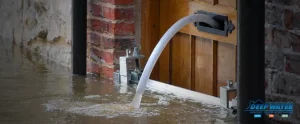Moisture is a common problem in the basement. It is especially true with the walls and the floor, which are often made of porous materials. Moisture can lead to the growth of molds, bacteria, and other microorganisms.
Most homeowners know that an often wet basement can lead to serious problems at home. It can result in leaks which can damage the home and pose a health risk. Basement waterproofing is the best solution for such a problem, particularly when it comes to the floors and walls.
Causes of Wet Basements
Before thinking of waterproofing a basement, you first need to determine why this underground space is frequently wet. Basements that are below grade or located below the ground are likely to accumulate excess moisture and eventually suffer from water damage. Below are the most common reasons why basements are often damp.
1. Cracks
Regardless of their size, cracks on the walls, floors, and foundation are openings that water and moisture can seep through. The water mainly comes from the wet soil around your property, rain, and groundwater. However, you should also consider plumbing problems as the water source.
2. Unsecured Entry Points
Basement windows and doors that are half-closed or have small openings will allow water to seep through and cause damage to the walls, especially if it’s raining hard.
3. Inadequate Drainage
Wet basement walls are usually caused by inadequate drainage where your drainage cannot handle water, especially in large amounts. After a heavy downpour, for instance, rainwater isn’t properly directed away from your home. Instead, it will pool somewhere in your foundation and eventually seep into your basement.
4. Poor Drainage System
Clogged gutters or slopes around your home can lead to poor drainage. Gutters should regularly be cleaned to allow water to flow freely. On the other hand, if you have land that slopes toward your house, you’ll have incoming water that will accumulate around the foundation, eventually leaking to your basement.
How to Waterproof Basement Walls
Waterproofing your basement is essential to keep moisture away. The potential damage that moisture and water seepage could cause to your basement walls can be severe. If you’re having the same problem, below are the steps you can follow to waterproof your basement walls.
1. Remove Standing Water
Before you waterproof the basement walls, it is crucial that you first drain all the water in the area. Once this has dried completely, you can assess the damage and decide the best course of action.
2. Remove Efflorescence
Water-soluble salt compounds in masonry works like basement walls will cause powdery, crystal-like deposits to form on the surface. The salt residue is usually due to water evaporation and is commonly referred to as efflorescence, which must be removed before you can begin waterproofing a basement. Removal of efflorescence will ensure the adhesion of the waterproofing paint.
There are products specifically formulated to remove efflorescence by mixing the product with muriatic acid but not water. So keep this in mind when you’re storing the solution.
3. Clean the Basement
The best waterproofing results are achieved when the target surface is dry, clean, and grease-free. Thus, you must remove all dirt, dust, debris, and broken masonry using a wire brush.
To clean the basement walls, use a scrub brush and a small amount of dish soap mixed in warm water. After washing the walls, rinse them with warm water and allow them to dry completely.
4. Remove Old Paint
If your basement walls were waterproofed previously, you would need to remove the original paint or coating before a new waterproofing can be applied. This can be completed using sandpaper, a wire brush, or a chemical stripper.
5. Plug All Holes
Hydraulic cement can be used to fill any cracks or apparent holes that you find in your basement walls. This can effectively stop water from flowing through the walls even when pressure is applied. You can use a trowel to smoothen the applied cement before it sets.
6. Reseal All Openings
Silicone caulk can be used to seal the windows and doors of your basement. An elastic sealant is also recommended, as this is usually flexible and waterproof.
When you waterproof the basement walls, conducting a perimeter check of the entire house may also be a good idea. Nearby unsealed windows can become points of entry for water, so you must seal them as well.
7. Apply Waterproof Coating
The final step to waterproof the basement walls is applying the appropriate coating. Use a nap roller, a nylon bristle brush, or a concrete sealer for this purpose. To ensure effective waterproofing, you should consider applying at least two coats. Before applying the initial coat, ensure that you read all the instructions and guidelines from the manufacturer.
Additionally, you should ensure that you have enough waterproofing paint to finish the job. A gallon of paint should effectively cover an area measuring 75-100 square feet. Also, when painting, ensure that the temperature does not go below 50 degrees F and that you have mixed the waterproof paint well, but not allowing it to dry.
Once the initial coat has been completely applied to your basement walls, let it dry for about three hours before proceeding with the second coat. Afterward, allow the walls to dry, then check for any pinholes. If you find some, apply an additional coat.
Key Takeaway
Waterproofing your basement walls is important if you want to avoid water damage. The steps involved in the process are easy to follow. However, you must ensure that the right materials are used and that the instructions are strictly observed.
Still, if sealing a basement is something that you think you are unable to handle well, you can get the services of professionals. The important thing to remember is that prevention is always better than repair. With this in mind, keep water damage away and seal basement walls.
Contact Deep Water Emergency Services and Mitigation for your water-damaged basement.
It’s not unusual for the basement to suffer from water damage because many of them are located in the ground area. The good news is that Deep Water Emergency Services and Mitigation can help you fix this common household problem.
Simply reach out to our water damage mitigation Denver team so your problem can be looked into and an effective solution presented. Hurry and call now because water damage is an issue that has to be acted upon immediately.






